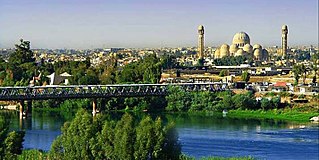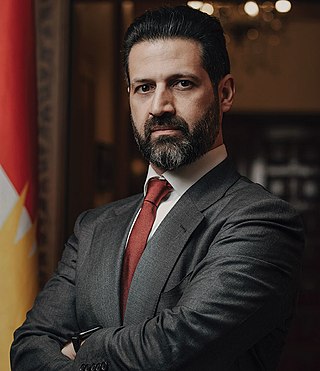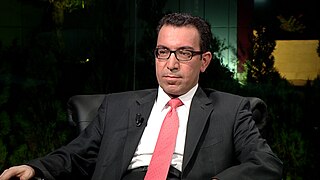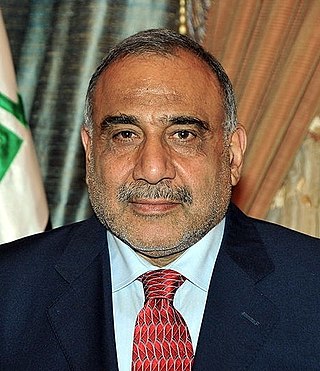
Kirkuk Governorate or Kirkuk Province is a governorate in northern Iraq. The governorate has an area of 9,679 square kilometres (3,737 sq mi). In 2017, the estimated population was 1,259,561 people. The provincial capital is the city of Kirkuk. It is divided into four districts.

Nineveh or Ninawa Governorate is a governorate in northern Iraq. It has an area of 37,323 km2 (14,410 sq mi) and an estimated population of 2,453,000 people as of 2003. Its largest city and provincial capital is Mosul, which lies across the Tigris river from the ruins of ancient Nineveh. Before 1976, it was called Mosul Province and included the present-day Dohuk Governorate. The second largest city is Tal Afar, which has an almost exclusively Turkmen population.

The Council of Representatives, usually referred to simply as the Parliament, is the unicameral legislature of the Republic of Iraq. According to the Constitution of Iraq, it is the lower house of the bicameral legislature of the country. As of 2020, it comprises 329 seats and meets in Baghdad inside the Green Zone.

Qubad Talabani is an Iraqi Kurdish politician who has been the Deputy Prime Minister of the Kurdistan Region since 2014. Formerly serving as the representative of Kurdistan to the United States, Qubad is the second son of former Iraqi President Jalal Talabani.

Governorate or provincial elections were held in Iraq on 31 January 2009, to replace the local councils in fourteen of the eighteen governorates of Iraq that were elected in the 2005 Iraqi governorate elections. 14,431 candidates, including 3,912 women, contested 440 seats. The candidates came from over 400 parties, 75% of which were newly formed.

Governorate or provincial elections were held in Iraq on 20 April 2013, to replace the local councils in the governorates of Iraq that were elected in the Iraqi governorate elections of 2009. Elections took place in 12 of Iraq's 18 governorates. Elections didn't take place in the 3 governorates forming the Kurdistan Region or Kirkuk, Anbar, or Nineveh, meaning that a total of 378 provincial council seats were up for election.

Najmiddin Karim, also known as Najmaldin Karim, was an Iraqi Kurdish politician who was governor of Kirkuk Governorate from 2011 to 2017. Prior to the invasion of Iraq, Karim had served in numerous Kurdish and Iraqi opposition groups.

An independence referendum for the Kurdistan Region of Iraq was held on 25 September 2017, with preliminary results showing approximately 92.73 percent of votes cast in favour of independence. Despite reporting that the independence referendum would be non-binding, the autonomous Kurdistan Regional Government (KRG) characterised it as binding, although they claimed that an affirmative result would trigger the start of state building and negotiations with Iraq rather than an immediate declaration of independence of Kurdistan. The referendum's legality was rejected by the federal government of Iraq.

Ayn Issa is a town in the Tell Abyad District of Raqqa Governorate in Syria. It is located halfway between the Syria–Turkey border town of Tell Abyad and the regional capital Raqqa. Through the city runs the M4 highway connecting Aleppo with the Hasakah Governorate.

Kurdistan 24 (K24) is a Kurdish broadcast news station based in Erbil, Kurdistan Region of Iraq, with foreign bureaus in Washington, DC. The service was launched on 31 October 2015. Noreldin Waisy is the founder and former general manager of Kurdistan 24.
Vian Sulaimani is an Iraqi beauty pageant titleholder who won the Miss Iraq 2017 but she was dethroned for being married.

Parliamentary elections were held in Iraq on 12 May 2018. The elections decided the 329 members of the Council of Representatives, the country's unicameral legislature, who in turn will elect the Iraqi president and prime minister. The Iraqi parliament ordered a manual recount of the results on 6 June 2018. On 10 June 2018, a storage site in Baghdad housing roughly half of the ballots from the May parliamentary election caught fire.

Noreldin Waisy,, is an Kurdish political analyst and journalist. He helped found the Kurdish media broadcasting outlets Rudaw and Kurdistan 24. He served as the general manager of Kurdistan 24, based in the Kurdistan's capital Erbil, from 2015 to 2019. Waisy currently serves as the press secretary to Kurdistan Regional Government (KRG) Prime Minister Masrour Barzani.

The Abdul Mahdi government was the government of Iraq, headed by Prime Minister Adil Abdul-Mahdi. It was approved by the Council of Representatives on 24 October 2018 and followed a general election in May 2018. The United Nations described the formation as an "exemplary peaceful transfer of power".
Lara Yussif Zara is an Assyrian politician who served as the mayor of the town of Alqosh in Nineveh Governorate, Iraq. Zara was appointed to the mayorship in July 2017 by the Kurdistan Democratic Party-led Nineveh Provincial Council after the previous mayor had charges of corruption by the Provincial Council. Zara is a member of the Kurdistan Democratic Party.

As sequel to protests in 2011, 2012 and 2013, Iraqi citizens have also in 2015 up until 2018 often and massively protested against the corruption and incompetence in their government which according to analysts and protesters had led to long-running problems in electricity supplies, clean water availability, Iranian interference in Iraqi politics, high unemployment, and a stagnant economy.

A series of demonstrations, marches, sit-ins and civil disobedience took place in Iraq from 2019 until 2021. It started on 1 October 2019, a date which was set by civil activists on social media, spreading mainly over the central and southern provinces of Iraq, to protest corruption, high unemployment, political sectarianism, inefficient public services and foreign interventionism. Protests spread quickly, coordinated over social media, to other provinces in Iraq. As the intensity of the demonstrations peaked in late October, protesters’ anger focused not only on the desire for a complete overhaul of the Iraqi government but also on driving out Iranian influence, including Iranian-aligned Shia militias. The government, with the help of Iranian-backed militias responded brutally, using live bullets, marksmen, hot water, hot pepper gas and tear gas against protesters, leading to many deaths and injuries.
Muhammad Jamil Al-Mayahi also known as Muhammad Jamil Oudeh Al-Gharibawi, was born in Iraq in Wasit Governorate in Al-Hayy district in 1983. He is one of the leaders of the National Wisdom Movement in Wasit Governorate in Iraq. He was elected as the governor of Wasit governorate by the Wasit provincial council in its session held on Tuesday (11/13-2018) to succeed the resigned Mahmoud Abd Al-Reda Talal, who won as a deputy in the parliament in its current session.
Parliamentary elections were held in Iraq on 10 October 2021. The elections determined the 329 members of the Council of Representatives who in turn elected the Iraqi president and confirmed the prime minister. 25 million voters are eligible to take part in Iraq's fifth parliamentary election since the 2003 US-led invasion and the first since the 2019 Iraqi October Revolution. The election result led to the clashes in Baghdad and an 11 month long political crisis.

Between the parliamentary election in October 2021 and October 2022, there was a political crisis in Iraq, with members of the Council of Representatives of Iraq being unable to form a stable coalition government, or elect a new President. Basic government services such as the civil service and military continued functioning, but the national political system was in deadlock including in respect of almost all major spending and taxation issues. On 27 October 2022, the government of Prime Minister Mohammed Shia' Al Sudani was approved by the Council of Representatives.




















